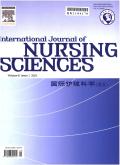Advance care planning readiness among older adults in aged service centers: A cross-sectional study
IF 3.1
3区 医学
Q1 NURSING
引用次数: 0
Abstract
Objective
This study aimed to explore the readiness for advance care planning (ACP) among older adults in Macau’s day service centers and investigate the influencing factors.
Methods
A cross-sectional study was conducted from October to December 2022 using a convenience sampling method. A total of 312 older adults were selected from 13 day service centers for older adults in Macau, China. The Advance Care Planning Acceptance Questionnaire and the Family Adaptation, Partnership, Growth, Affection, Resolve (APGAR) Scale were used to survey the older adults.
Results
A total of 306 older adults completed the survey. The score for advance care planning readiness was 65.55 ± 10.69, and 59.5% of participants (n = 182) were willing to participate in ACP. The family function score was 7.24 ± 2.51, while 70.3% of participants were from a highly functional family. The higher family function indicating a higher readiness for advance care planning (r = 0.396, P < 0.001). The multiple linear regression analysis indicated that the variables “age,” “knowledge of ACP,” “experience with ACP,” and “received resuscitation of yourself, relatives or friends” combined with “family function” can influence advance care planning readiness among older adults (R2 = 0.317, F = 27.898, P < 0.001).
Conclusions
Older adults in Macau’s day service centers were willing to engage in ACP. The importance of family involvement is highlighted in the ACP readiness. Health education and improved family communication are vital for promoting ACP, which ensures individuals receive care when they lack the capacity to make that choice. Additionally, healthcare professionals should enhance communication and education with older adults during the medical care process.
在老年服务中心的老年人中提前护理计划准备:一项横断面研究
目的探讨澳门日间服务中心老年人的提前照护计划准备情况及其影响因素。方法于2022年10月至12月采用方便抽样法进行横断面研究。在中国澳门的13个老年人日间服务中心共挑选了312名老年人。采用预先护理计划接受问卷和家庭适应、伙伴关系、成长、情感、决心(APGAR)量表对老年人进行调查。结果共有306名老年人完成了调查。提前护理计划准备得分为65.55±10.69,59.5% (n = 182)的参与者愿意参加ACP。家庭功能得分为7.24±2.51,70.3%的参与者来自高功能家庭。家庭函数越高,对提前护理计划的准备程度越高(r = 0.396, P <;0.001)。多元线性回归分析表明,“年龄”、“ACP知识”、“ACP经历”、“自己或亲友接受过复苏”等变量结合“家庭功能”对老年人的提前护理计划准备程度有影响(R2 = 0.317, F = 27.898, P <;0.001)。结论澳门日间服务中心的成年人有参与ACP的意愿。家庭参与的重要性在非加太计划的准备工作中得到强调。健康教育和改善家庭沟通对促进非加太至关重要,这确保个人在没有能力作出选择时得到照顾。此外,医疗保健专业人员应在医疗护理过程中加强与老年人的沟通和教育。
本文章由计算机程序翻译,如有差异,请以英文原文为准。
求助全文
约1分钟内获得全文
求助全文
来源期刊

International Journal of Nursing Sciences
Nursing-Nursing (all)
CiteScore
6.10
自引率
2.60%
发文量
408
审稿时长
25 days
期刊介绍:
This journal aims to promote excellence in nursing and health care through the dissemination of the latest, evidence-based, peer-reviewed clinical information and original research, providing an international platform for exchanging knowledge, research findings and nursing practice experience. This journal covers a wide range of nursing topics such as advanced nursing practice, bio-psychosocial issues related to health, cultural perspectives, lifestyle change as a component of health promotion, chronic disease, including end-of-life care, family care giving. IJNSS publishes four issues per year in Jan/Apr/Jul/Oct. IJNSS intended readership includes practicing nurses in all spheres and at all levels who are committed to advancing practice and professional development on the basis of new knowledge and evidence; managers and senior members of the nursing; nurse educators and nursing students etc. IJNSS seeks to enrich insight into clinical need and the implications for nursing intervention and models of service delivery. Contributions are welcomed from other health professions on issues that have a direct impact on nursing practice.
 求助内容:
求助内容: 应助结果提醒方式:
应助结果提醒方式:


